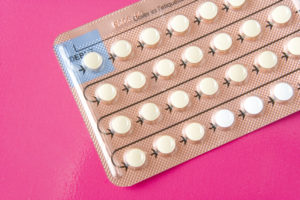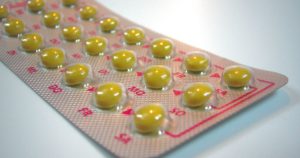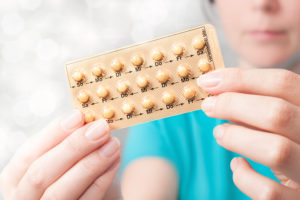Content
- 1 What are the ingredients of birth control pills?
- 2 How the contraceptive pill works
- 3 How are birth control pills useful?
- 4 The harm of birth control pills and side effects
- 5 Consequences of taking birth control pills
- 6 Contraindications to taking birth control pills
- 7 How to drink birth control correctly
- 8 Frequently asked Questions
- 8.1 Do birth control pills get fat?
- 8.2 Can birth control pills cause infertility?
- 8.3 Is it possible to get pregnant while taking birth control pills
- 8.4 Do birth control pills work for acne
- 8.5 Can birth control pills cause cancer?
- 8.6 Do birth control pills affect libido?
- 8.7 Can I choose birth control pills myself?
- 9 Conclusion
Lack of adequate contraception is fraught with unplanned pregnancy. Birth control pills are considered one of the most effective methods of contraception. The benefits and harms of birth control pills have been studied extensively. The drugs affect hormones and the functioning of the body as a whole, which can be manifested by a change in well-being.

What is included in birth control pills
The beneficial properties of birth control pills are due to their composition. COCs include 2 components:
- Estrogenic. Thanks to synthetic hormones, an imitation of the normal development of the endometrium occurs. Thus, the likelihood of uterine bleeding is excluded.
- Progestogenic. The useful component prevents pregnancy, which is achieved as a result of the necessary changes in the functioning of the reproductive organs.
Most birth control pills contain ethinyl estradiol (the active estrogen). Progestogens are derivatives of 19-nortestosterone:
- Levonorgestrel;
- Norethisterone;
- Norgestrel.
Modern progestogens include:
- Drospirenone;
- Gestodene;
- Dezostrel;
- Dienogest.
Gynecologists recommend taking pills exclusively with a progestogen component to patients after childbirth. These useful drugs are called mini-pills. This is due to the properties and composition of the COC. Estrogens have the ability to suppress breast milk production.
The gestagenic birth control pill (Charosetta) is given to women to limit the intake of estrogen. Gestagens are indicated for diabetes, hypertension, obesity. Otherwise, COCs may be harmful.
If the concentration of estrogen is less than 35 μg, such COCs are considered low-dose. Microdosed contraceptives differ in the content of estrogen in the amount of 20-30 mcg. High-dose birth control pills contain 50 mcg of ethinyl estradiol.
There are 3 types of contraceptive pills, depending on the composition:
- Monophasic. The content of useful components is the same in all pills. There are low-dose (Femoden, Regulon and Marvelon) and micro-dose (Logest, Novinet and Mersilon).
- Two-phase. Includes a constant amount of estrogen.The concentration of progestogens increases during phase 2 of the cycle. The total dose of estrogen is significantly higher compared to monophasic COCs. The dosage of progestogens is reduced. Among the new generation drugs that are also useful as a therapeutic agent, Trialene, Tri-merci and Trisilest stand out.
- Three-phase. The hormone ratio is changed to mimic the natural cycle.
Some birth control pills have useful antiandrogenic properties because they include a progestogen. Among COCs with antiandrogenic properties, Janine and Diane-35 are distinguished. Novinet, Tri-merci and Regulon have a pronounced progesterone-like effect.
The fourth generation progestogenic substance is drospirenone. The component is characterized by useful properties:
- antiestrogenic;
- antigonadotropic;
- antiandrogenic.
Drospirenonne does harm to the body in the form of severe side effects and is recommended for women with pressure surges. The benefits of birth control pills are in relieving PMS symptoms.
The following combinations of progestogens and estrogens are called:
- estrogen + norgestrel (Cyclo-proginova);
- levonorgestrel + estrogen (Rigevidon, Mikroginon);
- estrogen + desogestrel (Marvelon, Novinet);
- gestodene + estrogen (Femoden, Gestarella);
- estrogen + norgestimate (Dimia, Yarina);
- estrogen + nomegetrol (Zoely);
- ethinyl estradiol + dienogest (Janine).
Combinations of estrogens and progestogens:
- estrogen + levonorgestrel (Tri-regol);
- estrogen + desogesrel (Three-merci).
Progestogens are represented by the following synthetic hormones:
- levonorgestrel (Excapel);
- linestrenol (Excluton);
- desogestrel (Charosetta).

How the contraceptive pill works
The benefits and harms of oral contraceptives are due to their action. Birth control pills block the mechanism of ovulation. At the same time, reminiscent of monthly cyclical bleeding remains. The development of the follicle and egg does not occur, which makes pregnancy impossible.
Changes are also observed in the endometrium. Thus, the possibility of attachment of a fertilized egg is excluded. Cervical mucus thickens, which prevents sperm from moving.
How are birth control pills useful?
The benefits of hormonal contraceptives for the female body are undeniable. COCs are used not only for contraceptive, but also for therapeutic purposes in various pathological conditions.
The health benefits of birth control pills include:
- cycle stabilization;
- a decrease in the amount of discharge, which helps to eliminate anemia;
- decrease in the intensity of pain syndrome during menstruation;
- increasing the protective qualities and properties of cervical mucus and reducing the risk of infectious processes;
- prevention of mastopathy;
- suppression of androgen synthesis, causing the elimination of hirsutism, acne;
- increased bone density and a beneficial effect on the absorption of calcium, which is the prevention of osteoporosis.
Hormone pills are beneficial for women. According to the research results, there is a decrease in the risk of developing cancer of the reproductive organs in women taking COCs for a long time. As a rule, we are talking about endometrial, breast and ovarian cancer.
The beneficial effect of contraceptive pills on the body is manifested in the possibility of treating many hormone-dependent diseases.Oral contraceptives are used to treat endometriosis, PCOS, hirsutism, and some forms of infertility.

The harm of birth control pills and side effects
Hormone pills are both beneficial and harmful. This is due to their basic properties.
Side effects may occur when taking oral contraceptives. In most cases, undesirable effects are mild. Often, adverse reactions do not harm the body and occur in the first months of admission.
There are two main groups of adverse reactions:
- Clinical. This item includes general changes and disorders that cause deviations in the menstrual cycle. Common effects include dizziness, weight gain, headache, depression, and rash. In case of hair loss, the replacement of the drug with another is required. Against the background of cycle disturbances, acyclic spotting may be noted. Normally, such discharge disappears within 3 months. Otherwise, the drug is canceled.
- Hormone dependent. The effects are due to the specific type of synthetic hormones and their properties.
In most cases, adverse reactions do not cause serious harm to the body. They are usually temporary, go away on their own and do not require specialist advice or drug withdrawal.
Consequences of taking birth control pills
The consequences of the use of COCs are rare and usually associated with the wrong choice of drugs. Due to atrophy of the inner layer of the uterus, amenorrhea is possible. This phenomenon takes place either on its own or is corrected with medication.
Severe consequences that harm the body can include:
- thrombosis;
- thromboembolism.
Contraindications to taking birth control pills
To minimize the harm that oral contraceptives can cause, before using them, it is necessary to exclude possible contraindications for taking:
- arterial and venous thrombosis;
- a history of ischemic attack;
- Ischemic heart disease;
- diabetes mellitus with arisen vascular disorders;
- migraine;
- severe pathologies of the pancreas and liver;
- tumors of the mammary glands and genitals, as well as the liver;
- uterine bleeding of unknown etiology;
- pregnancy.

In case of contraindications to the use of oral contraceptives, you can use non-hormonal birth control pills, which have anti-inflammatory benefits. These are vaginal tablets or spermicides. Despite the benefits of using these drugs, the contraceptive effectiveness is about 80%. The most common drugs in this group include Gynecotex and Benatex.
How to drink birth control correctly
Useful tablets are taken for a long time, at least 3-6 months. The duration of admission is determined by the purpose of use and specific indications.
The dosage regimen depends on the chosen drug. For many years, doctors used a regimen that included taking the pill for 3 weeks. Pill use was resumed after a 7-day break. Recently, a scheme has been increasingly prescribed, which implies the use of tablets for 24 days. The break is only 4 days.
A break is necessary for withdrawal bleeding to occur. It resembles menstruation and can continue during the first days after starting to use the next package.
Sometimes regimens are used to delay the onset of menstruation or shorten the number of cycles, which is beneficial in some cases. Long-term use of contraceptives is necessary in the treatment of endometriosis, fibroids and means the absence of menstruation for several months.
The pills are taken orally once a day, preferably at a set time. For convenience, many manufacturers produce drugs in special blisters and packages, which makes it easier to count the day.
Skipping pills can cause harm in the form of reduced contraceptive protection. The effectiveness is reduced if the pill is missed for more than 12 hours. In such cases, it is recommended to use barrier methods of protection for 1 week.
Frequently asked Questions
There are many myths associated with the contraceptive pill, which leads to a significant number of questions from patients.
Do birth control pills get fat?
Some women refuse to use oral contraceptives because of the risk of weight gain. This phenomenon is listed among the side effects.
The appearance of extra pounds is associated with the properties of drugs and the effect on the hormonal system. Significant weight gain indicates the need to replace the contraceptive.
Can birth control pills cause infertility?
The onset of pregnancy is possible within 1-12 months after the abolition of the contraceptive. In some cases, there is a violation of the cycle, the recovery of which takes a longer period.
Birth control pills do not cause harm in the form of infertility. Their use is sometimes used for 3 months to stimulate ovulation.
Is it possible to get pregnant while taking birth control pills
The benefits of tablets are high efficiency, which is 99%. The likelihood of pregnancy is practically excluded if all the rules for taking the drug are observed.
Do birth control pills work for acne
The use of birth control pills goes beyond protection. Tablets with an antiandrogenic effect have beneficial properties, which are to eliminate excess skin oiliness and greasy hair. These birth control pills can help clear up acne caused by increased levels of male sex hormones. While taking it, there is a decrease in the intensity of the growth of unwanted body hair.

Can birth control pills cause cancer?
There is a widespread belief that COCs cause harm in the form of the development of malignant tumors. Modern birth control pills have been proven to be beneficial and not cancer-causing.
Do birth control pills affect libido?
The benefits of birth control pills are beyond question. The pills affect the hormonal background, on which the severity of sexual desire depends. Some women report a decrease in libido, which is a side effect of drugs.
Can I choose birth control pills myself?
Birth control pills are available from pharmacies with a prescription. This means that their use should be recommended by a doctor after an adequate examination of the hormonal background. Taking birth control pills uncontrollably is bad for your health.
Conclusion
The benefits and harms of birth control pills are obvious. Gynecologists consider hormonal contraception the gold standard. This is due to the effectiveness, good tolerability of drugs. Medicines have not only a contraceptive, but also a therapeutic effect due to their properties. In order for the medicine to be beneficial, it is necessary to consult a specialist and perform the necessary research.

